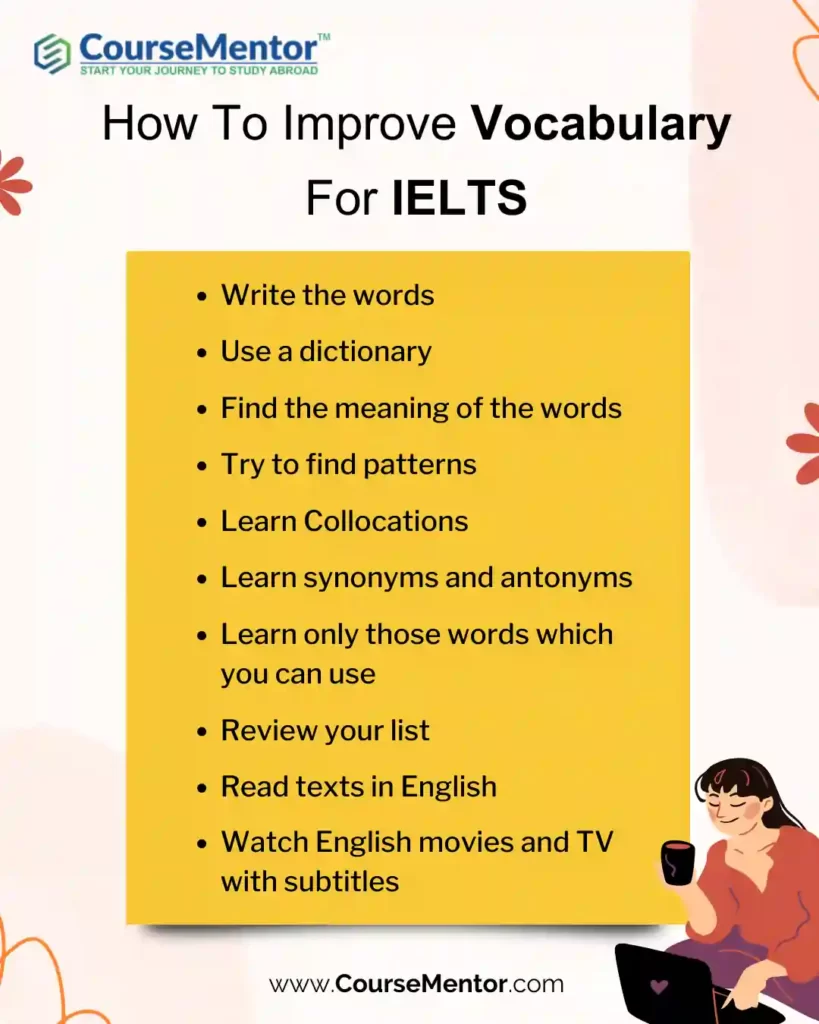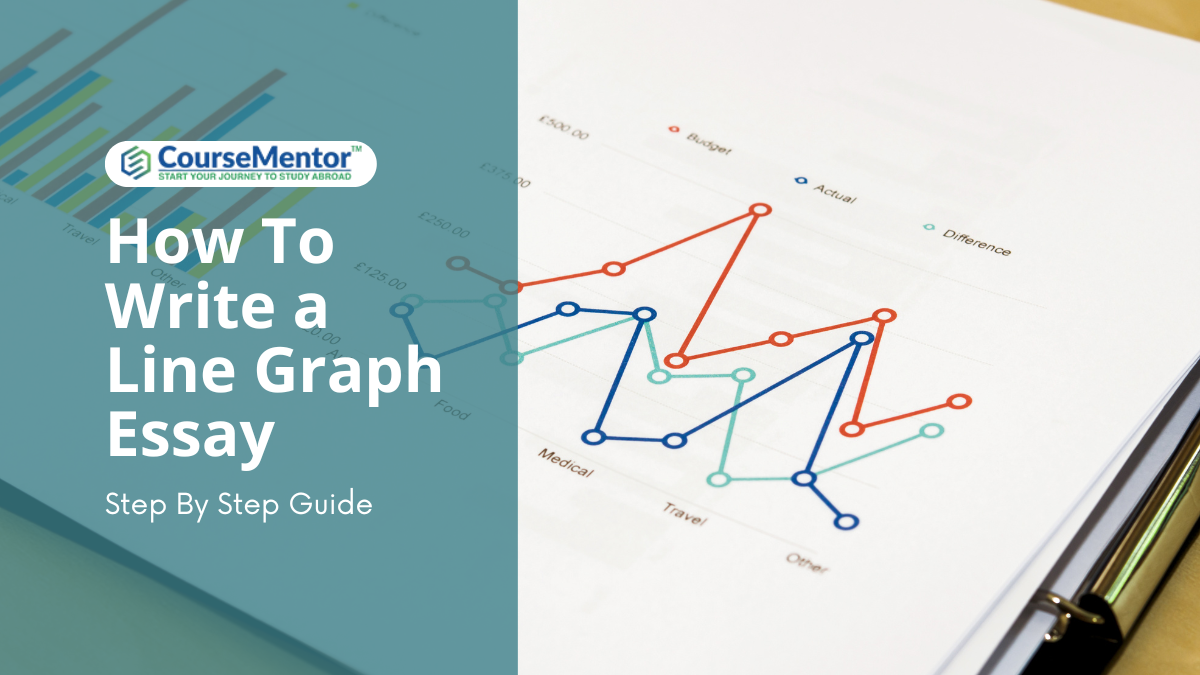How to improve vocabulary for IELTS? This is the first concern of every candidate who wants to take the IELTS exam.
IELTS is the most accepted and trusted English language testing exam in India. Every student from a non-English speaking country has to give an English language testing exam to migrate to an English-speaking nation to work or study.
There are many English testing exams accepted by universities but the IELTS stands as the most trusted and given by Indian students.
IELTS tests your English speaking skills in four sections:
- Writing section
- Reading section
- Speaking section
- Listening section
All these sections test different skills and it is essential to score well in every section to secure a higher band.
Even though different areas require different skills to score well, some skills are required to score well in every section.
One of these skills that can improve your score in every section is Vocabulary. If your vocabulary is good then you can use it in writing, reading, speaking, or listening section. Thus, it is essential to sharpen your vocabulary to improve your score.
In this blog, I will give some tips and answers on how to improve vocabulary for IELTS.
What Is Vocabulary?
Before we jump to some tips on how to improve vocabulary for IELTS, first let’s understand what is vocabulary and how can you use it.
Vocabulary is nothing but all the uncommon words that you know but don’t use in daily life.
We all know general English words, but it is important to know some unique or so-called hard words to improve the quality of your answers.
There is a lot of vocabulary for IELTS books available which list thousands of words with their meaning and usage from which you can improve your vocabulary.
How Can You Use It To Improve Your Score?
Just knowing the hard words is not enough, you should also know the meaning and usage of those words. Many students do not know the meaning and the correct usage of vocabulary which results in incorrect placement of words and a reduction of marks.
It is not important to know many words. The important thing is to know the meaning and usage of some uncommon words.
You can use vocabulary to enhance your score in all the sections, but it can be particularly useful in the writing and speaking sections. So it is important to improve vocabulary for IELTS speaking and writing.
Tips on how to improve vocabulary for IELTS
Here are the best tips that students must use if they want to improve their vocabulary for the IELTS exam:

- Write the words
- Use a dictionary
- Find the meaning of the words
- Try to find patterns
- Learn Collocations
- Learn synonyms and antonyms
- Learn only those words which you can use
- Review your list
- Read texts in English
- Watch English movies and TV with subtitles
Write the words
There is enough evidence to prove that writing things down helps you to remember them more. Many students do not write the vocabulary they read from different sources, hoping they would remember them.
This, however, doesn’t work in the exam; you will not remember everything you read. To improve the chances of remembering and revising, take a separate notebook for writing vocabulary and write it down.
Make sure that your write in good handwriting so you feel like opening the book and revising. Writing it down will surely help you to gain some clarity on how to improve vocabulary for IELTS.
Use a dictionary
A dictionary surely will give you all the vocabulary you need, but you will also have a lot of words that are not useful. To tackle this issue, you can use some of the vocabulary dictionaries specially made to improve your vocabulary.
These are easily available on the internet. You can also refer to some online dictionaries, many of which daily release a new word that you can use. This is the second tip on how to improve vocabulary for IELTS.
Find the meaning of the words
Many students read a lot of new words but do not learn their meaning or usage. Whenever you write a new word in your notebook, try to write and understand its meaning and also write the different forms of the word.
For example, pollute, pollution, pollutant, polluted. This will not only help you to find the correct meaning but will also help you to use the word correctly in your answers.
The tense of the word is also important to understand. This is the third tip on how to improve vocabulary for IELTS.
Try to find patterns
When you write words in different forms, you may face difficulty in remembering the correct forms of some words.
To avoid this, try to find patterns in the forms of words. For example, strong- Strength- strengthen, long- length- lengthen, you can easily identify the pattern that is following.
Another example is educate- education, donate- donation. This pattern finds will make your task of how to improve vocabulary for IELTS easier.
Learn Collocations
Collocations are the most important part of how to improve vocabulary for IELTS. Collocations are set of words that are always used together.
This is also the area in which the majority of people make mistakes. A simple example of a collocation is ‘heavily polluted’; notice how ‘heavily’ always goes with ‘polluted’, and thus you cannot say ‘strongly polluted’ or ‘majorly polluted’.
A strong understanding of collocations will help you to learn fixed academic phrases. Learning these phrases will help you write your answers more fluently.
For example, without having to think much about the correct word, you can use ‘to ease traffic congestion,’ ‘to reverse global climate change’, and ‘having a detrimental effect on the environment’.
These are words that always go with each other, and this will help you save time and improve the quality of your answers.
You can learn about these phrases easily from the IELTS practice texts or some books that are designed to improve your collocation usage.
These are easily available on the internet; just search collocations or phrases for IELTS speaking on google. Using collocations will surely help you get more clarity on how to improve vocabulary in IELTS.
Learn synonyms and antonyms
Synonyms are different words that have the same meaning, and antonyms are words with different meanings. When you learn to use synonyms and antonyms, take care that you understand the correct usage.
For example, clear has the same meaning as lucid, but you cannot say ‘lucid understanding.’ Use words that can be replaced, like pollution can be replaced by contamination, even though both are different.
Learn only those words which you can use
There are a lot of hard words which you can learn, but you cannot use all of them in sentences. Try to learn only those words which you can be comfortable and confident enough to use in your answers.
This way, you can decrease the large number of words you are learning. I suggest you learn 100-150 new words with diverse meanings and try to use them daily.
Review your list
When you write new words in your notebook, it may be possible that after some days of revision, you feel like some words are too easy for you to use and some are difficult to use.
The easy words can be revised some days before the test. This review system will help you save time and remember all the hard words from daily revision.
Read texts in English
Reading texts in English is one of the most important tips for how to improve vocabulary for IELTS. These texts can be anything informative that you can read occasionally.
You can read newspapers as they consist of precise, formal, and informative writing. The newspapers also consist of several useful vocabularies for IELTS.
Don’t just read and forget the words; highlight a piece of writing that you found interesting or a word that you need to write.
Before highlighting and writing in your notebook, identify the word’s meaning from an online dictionary.
Academic papers in journals are also a good source of vocabulary as they have a formal and rich sense of writing.
Watch English movies and TV with subtitles
This is my favorite tip for how to improve my vocabulary for IELTS. This is also the most fun task to do, you might already be watching some English series or movies.
You just have to watch your series with English subtitles. This is the biggest source of local vocabulary, and as it is a movie and it has expressions, you need not find the word’s meaning; you can easily know what the word means just by the expressions of the actors.
You can take this task a step ahead by watching specific series or movies. Suppose you are aiming to move to the UK (United Kingdom), then try to watch a UK series or movie, this easy you will develop an understanding of local words, the accent and you will get to know how people in that country usually talk.
Useful Vocabulary List For IELTS
After knowing how to improve vocabulary for IELTS, here are some advanced-level vocabulary for IELTS that you can use in your speaking and writing to get a high band score in the IELTS exam.
So, let’s have some words with their meaning.
| Word | Meaning | Word | Meaning |
| Grasping | Greedy | Dull | Blunt |
| Maneuver | Manipulate | Uncared For | Neglected |
| Wonderful | Marvelous | Unbiased | Impartial |
| In The Meantime | Meanwhile | Deserted | Abandoned |
| Reminiscence | Memory | To Denote | To Indicate, To Represent |
| Obligatory | Compulsory | Occult | Mysterious |
| Unforeseen | Unexpected | Daybreak | Dawn |
| Contemporary | Modern | Trivial | Worthless |
| Humble | Modest | Arise | Occur |
| Religious | Devout | Mild | Gentle |
| Impolite | Rude | Worn | Old |
| Temper | Mood | Amateur | Beginner |
| Immobile | Motionless | Possibility | Opportunity |
| Hearsay | Rumor | To Intend | To Mean |
| Homicide | Murder | Inventory | Stock |
| Incidentally | By The Way | Surplus | Excess |
| To Condemn | To Sentence | Deliberate | Planned |
| Passable | Satisfactory | Precedence | Priority |
| Contented | Satisfied | Inheritor | Heir |
| Acquit | To Release | Awful | Terrible |
| Ambition | Dreams | Anxious | Nervous |
| Facelift | To Modify Something | Frivolous | Trivial, Unimportant, Silly |
| Frigid | Freezing, Frosty | Far-Flung | Very Far Away |
| Inroads | Affect | Homesickness | Person Who Can’t Live Away From Home |
| Nuisance | Disturbance | Jubilant | Overjoyed, Delighted, Elated |
| Gaudy | Showy, Garish, Vulgar | Handy | Useful, Convenient, Skillful |
| Outraged | Very Upset | Praise | Compliment |
| Lethal | Deadly | Overwhelmed | Very Happy With Something |
| Incarnation | Birth | Humiliate | Embarrass, Disgrace, Dishonor |
| Raze | Destroy, Demolish | Reluctant | Unwilling, Hesitant |
| Havoc | Lots Of Trouble | Verdict | Result |
| Rejuvenate | Refresh | Inevitable | Unstoppable |
| Fatal | Deadly, Mortal, Killing | Sheer | A Very High Amount Of Something |
| Plunge | To Fall | Shrine | Holy Place Or Sacred Place |
| Reluctant | Hesitant | Gaunt | Scrawny, Skinny, Thin |
| Gut Feeling | Inner Voice | Prestigious | Very Important |
| Land Slide Victory Or Thumping Victory | Victory By Huge Margin | Retrograde | Moving Backwards |
| Moderate | Temperate, Lenient, Medium | Flippant | Excess Talkative |
| Inferior | Lesser, Substandard | Premises | Area |
| Jolly | Merry, Jovial, Joyful | Infuriate | Enrage, Agitate, Provoke |
| Fluke | Bi-Chance | Overlook | Miss |
| Intimate | Inform | Loiter | To Roam Around Without Aim |
| Moist | Wet | Glossy | Shiny |
| Adroit | Expert | Alteration | Change |
| Adequate | Sufficient | Ambiance | Environment |
| Amicable | Helpful | Abode | A Place Where You Live |
| Authentic | Genuine | Abstraction | To Deduct |
| Bizarre | Weird | Dire Need | Huge Need For Something |
| Blunder | A Very Big Mistake | Docile | Tame, Gentle |
| Bread And Butter | Livelihood | Deteriorate | Something Gets Worse |
| Berserk | Gone Mad | Descendent | Next Generation |
| Cunning | Clever | Dilemma | State Of Confusion |
| Compassion | Ready To Serve | Deliberate | Something Planned |
| Calamity | Disaster | Enquire | Investigate |
| Crumble | Something Breaks In Small Pieces | Ethical | Genuine |
| Chaos | Noisy Situation | Exemplary | Extra Ordinary |
| Counsel | Advise | Elitist | Choosy Or Selective |
| Dubious | Doubtful, Questionable | Exempt | Except That |
| Despise | Hate, Detest, Loathe | Eternal | Never-Ending |
| Destitute | Poor, Penniless | Forbid | To Deny |
Conclusion
I hope these 10 tips on how to improve vocabulary for IELTS would have helped you to understand what vocabulary is and how you can practically improve your vocabulary.
All these tips given here are practical tips that you can do in your day-to-day life. Having a good sense of vocabulary will not only increase your score, but it will also help you to speak more confidently and fluently.
If you still have any queries related to this, contact our experts and keep visiting CourseMentor™ for more interesting and informative content like this.
All the best for your preparations for IELTS and the vocabulary in IELTS.
Read our other blog to know Cambridge Vocabulary For IELTS Advanced Words.
FAQs
Where can I learn vocabulary for IELTS?
The best way to learn vocabulary is by reading newspapers and magazines. You are advised to write down any new word you read and try to use that word in sentences.
How can I learn vocabulary naturally?
The best way to learn something new naturally and fast is to practice, practice, and practice. Whenever you heard or read any unknown or new word, write it down and try to practice it daily.
Does IELTS repeat questions?
Yes, just like other exams, IELTS also repeats questions. It is possible that if you take the IELTS exam in a 3 to 4 month gap, you may face the same questions in speaking and writing of the IELTS exam.
What should I avoid in IELTS Speaking test?
Here are some things that you must avoid in an IELTS exam.
Responding to a question with Silence.
Flat, monotone pronunciation.
Simple vocabulary.
Short answers.
Opening to cue card by repeating the question.





